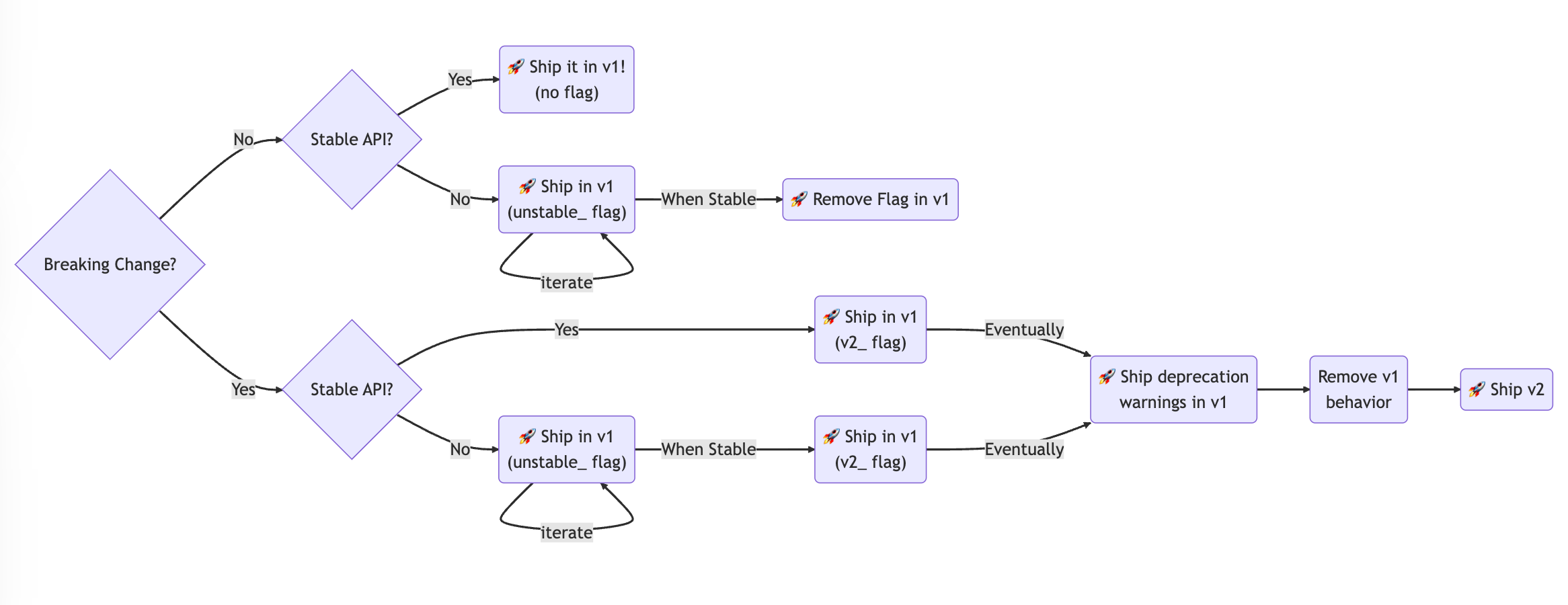API Development Strategy
API Development Strategy
Let's cut to the chase - major version upgrades can be a pain. Especially for something as foundational to your application as the framework or router it's built on. For Remix and React Router, we want to do our best to give you the smoothest upgrade experience possible.
Goals
Our goals for major Remix and React Router releases are:
- Developers can opt-into SemVer-major features individually as they are released instead of having to wait to adopt them all at once when a new major version hits NPM
- Having opted into features ahead-of-time, developers can upgrade to new major versions in a single short-lived branch/commit (hours, not weeks)
Implementation
We plan to do this via what we're calling Future Flags in the remix.config.js file. Think of these as feature flags for future features. As we implement new features, we always try to do them in a backwards-compatible way. But when a breaking change is warranted, we don't table that feature up for an eventual v2 release. Instead, we add a Future Flag and implement the new feature alongside the current behavior in a v1 minor release. This allows users to start using the feature, providing feedback, and reporting bugs immediately.
That way, not only can you adopt features incrementally (and eagerly without a major version bump), we can also work out any kinks incrementally before releasing v2. Eventually we also then add deprecation warnings to the v1 releases to nudge users to the new behavior. Then in v2 we remove the old v1 approach, remove the deprecations, and remove the flag - thus making the flagged behavior the new default in v2. If at the time v2 is released, an application has opted into all future flags and updated their code - then they should just be able to update their Remix dependencies to v2 and delete the future flags from their remix.config.js and be running on v2 in a matter of minutes.
Unstable vs. V2 Flags
Future flags come in 2 forms:
future.unstable_feature
unstable_ flags allow us to iterate on the API with early adopters as if we're in v0.x.x versions, but for a specific feature. This avoids churning the API for all users and arriving at better APIs in the final release. This does not mean that we think the feature is bug-ridden! We absolutely want early adopters to start using these features so we can iterate on (and/or gain confidence in) the API.
future.v2_feature
v2_ indicates a breaking change from v1 behavior and implies (1) that the API is considered stable and will not under any more breaking changes and (2) that the API will become the default behavior in v2. A v2_ flag does not mean the feature is bug-free - no software is! Our recommendation is to upgrade to v2 flags as you have the time, as it will make your v2 upgrade much smoother.
Example New Feature Flow
The decision flow for a new feature looks something like this:

The lifecycle is thus either:
- Non-Breaking + Stable API Feature -> Lands in v1
- Non-Breaking + Unstable API ->
future.unstable_flag -> Lands in v1 - Breaking + Stable API Feature ->
future.v2_flag -> Lands in v2 - Breaking + Unstable API ->
future.unstable_flag ->future.v2_flag -> Lands in v2
Current Future Flags
Here's the current future flags in Remix v1 today:
| Flag | Description |
|---|---|
unstable_dev |
Enable the new development server (including HMR/HDR support) |
v2_errorBoundary |
Combine ErrorBoundary/CatchBoundary into a single ErrorBoundary |
v2_meta |
Enable the new API for your meta functions |
v2_normalizeFormMethod |
Normalize useNavigation().formMethod to be an uppercase HTTP Method |
v2_routeConvention |
Enable the flat routes style of file-based routing |
We're in the process of preparing for our v2 release, so all future.unstable_ flags are being stabilized into future.v2_ flags (except for those which are not breaking changes, like PostCSS/Tailwind/Vanilla Extract support). This includes adding deprecation warnings for apps still using the old way. Once we stabilize them all we'll do a final Remix 1.15.0 release and let that run for a bit to give folks time to opt into any flags they haven't yet added. Then we'll plan to release Remix 2.0.0 and start working on releasing flag-driven Remix v3 features.